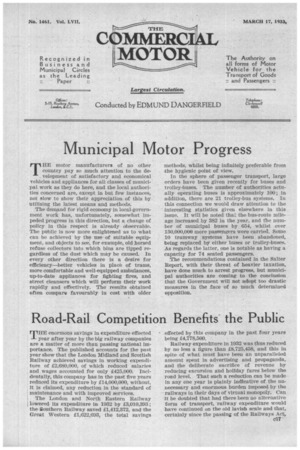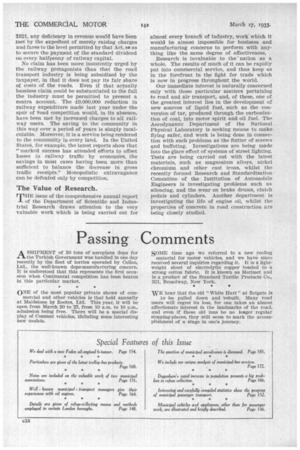Road-Rail Competition Benefits the Public
Page 67

Page 68

If you've noticed an error in this article please click here to report it so we can fix it.
THE enormous savings in expenditure effected year after year by the big railway companies are a matter of more than passing national importance. The published accounts for the past year show that the London Midland and Scottish Railway achieved savings in working expenditure of 12,680,000, of which reduced salaries and wages accounted for only £425,000. Incidentally, this company has in the past five years reduced its expenditure by £14,000,000, without, It is claimed, any reduction in the standard of maintenance and with improved services.
The London and North Eastern Railway lowered its expenditure in 1932 by £3,010,393; the Southern Railway saved £1,412,372, and the Great Western £1,022,693, the total savings effected by this coMpany in the past four years being £4,778,500.
Railway expenditure in 1932 was thus reduced by no less a figure than £8,725,458, and this in. spite of what must have been an unparalleled amount spent in advertising and propaganda, and the deliberate sacrifice of revenue by reducing excursion and holiday fares below the road level. That such a reduction can be made in any one year is plainly indicative of the unnecessary and enormous burden imposed by the railways in their days of virtual monopoly. Can it be doubted that had there been no alternative form of transport, railway expenditure would have continued on the old lavish scale and that, certainly since the passing of the Railways Act, 1921, any deficiency in revenue would have been met by the expedient of merely raising charges and fares to the level permitted by that Act, so as to secure the payment of the standard dividend on every halfpenny of railway capital.
No claim has been more insistently urged by the railway protagonists than that the road transport industry is being subsidized by the taxpayer, in that it does not pay its fair share of costs of the roads. Even if that actually baseless claim could be substantiated to the full the industry must be permitted to present a contra account. The £0,000,000 reduction in railway expenditure made last year under the spur of road competition would, in its absence, have been met by increased charges to all railway users. The saving to the community in this way over a period of years is simply incalculable. Moreover, it is a service being rendered to the community in every land. In the United States, for example, the latest reports show that "marked success has attended efforts to offset losses in railway traffic by economies, the savings in most cases having been more than sufficient to balance the decrease in gross traffic receipts." Monopolistic extravagance can be defeated only by competition.
The Value of Research.
THE issue of the comprehensive annual report of the Department of Scientific and Industrial Research draws attention to the very valuable work which is being carried out for almost every branch of industry, work which It would be almost impossible for business and manufacturing concerns to perform with anything like the same degree of effectiveness.
Research is invaluable to the ' nation as a whole. The results of much of it can be rapidly put into commercial service, and thus keep us In the forefront in the fight for trade which is now in progress throughout the world.
Our immediate interest is naturally concerned only with those particular matters pertaining to road and air transport, and, of these, one of the greatest interest lies in the development of new sources of liquid fuel, such as the conversion of tar, produced through the carbonization of coal, into motor spirit and oil. fuel. The Aerodynamic Department of the National Physical Laboratory is seeking means to make flying safer, and work is being done in connection with such problems as the flutter of screws and buffeting. Investigations are being made into the glare effect of systems of street lighting. Tests are being carried out with the latest materials, such as magnesium alloys, nickel chromium and other cast irons, whilst the recently formed Research and Standardization • • Committee of the Institution of Automobile Engineers is investigating problems such as silencing, and the wear on brake drums, clutch pedals and cylinders. Another department is investigating the life of engine oil, whilst the properties of concrete in road construction are being closely studied.




































































































































































